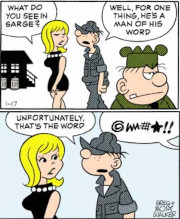|
Home
|
Aug 12, 2024
This week’s themeCoined words This week’s words grawlix bardolatry semelparous broadbrow topophilia 
Beetle Bailey
Comic: Mort Walker Previous week’s theme Loanwords and loan translations A.Word.A.Day
with Anu GargHow do you feel about a newly coined word? Some delight in new words, others feel discomfort. Is the language growing or is it being debased? Jonathan Swift (1667-1745) didn’t care for newfangled words, saying:
I have done my utmost for some years past to stop the progress of
mob and banter, but have been plainly born [beaten] down by numbers, and
betrayed by those who promised to assist me.
Never mind that Swift himself added new words to the language, though unwittingly, when his characters became words in the English language. The poet Samuel Butler (1612-1680) once wrote:
For he cou’d coin, and counterfeit New words, with little or no wit; Words so debas’d and hard, no stone Was hard enough to touch them on;* And when with hasty noise he spoke ‘em, The ignorant for current took ‘em. The way I see it, every new word is a sign of inventiveness, of trying to make sense of our ever-changing world, of not giving up. New words? The more the merrier. With time, some words, like selfie or emoji, become part of our everyday vocabulary, while others fade into obscurity. In a sense every word is a coined word. This week we’ll feature five words whose coiners we know about. Have you ever coined a word? Email us at words@wordsmith.org or share below, but google it first to make sure it’s truly new. Sometimes, great minds think alike, and two (or more) people independently invent the same word. *Language changes in other ways too. At the time Samuel Butler wrote those lines, stone rhymed with on. grawlix
PRONUNCIATION:
MEANING:
noun: The characters, such as @#%$*!, used to convey profanity in a comic.
ETYMOLOGY:
Coined by the cartoonist Mort Walker (1923-2018). Earliest documented use: 1964.
USAGE:
“This title contains ... negligible cursing (sometimes represented as a grawlix).” Adult Books 4 Teens; School Library Journal (New York); Mar 2019. A THOUGHT FOR TODAY:
People share a common nature but are trained in gender roles. -Lillie
Devereux Blake, novelist, essayist, and reformer (12 Aug 1833-1913)
|
|
Subscriber Services
Awards | Stats | Links | Privacy Policy
Contribute | Advertise
Awards | Stats | Links | Privacy Policy
Contribute | Advertise
© 1994-2026 Wordsmith